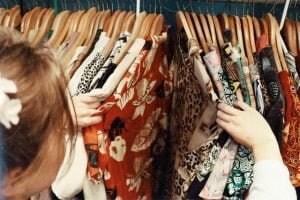Why Thrifting is Better for the Environment
Thrifting or shopping secondhand is a great way to reduce your environmental footprint while finding some really cool and unique items that you wouldn’t be able to get elsewhere.
Buying items brand new might not seem like it has a very big impact on the environment, but every small action counts. By shopping for things second hand, you are voting with your dollar as a consumer to not support the industries that cause pollution and tons of waste. Here are some of the many reasons why thrifting is better than buying new items.
1) LESS RESOURCE CONSUMPTION
The creation of new things takes a lot of resources, especially in today’s world of fast fashion and hyper–consumerism. Some of these natural resources are being used at a rate that is faster than they can be produced and are non-renewable. When it comes to clothing, electronics, and other home goods, it takes a lot of water and energy to make these items. When you thrift something, you are not directly supporting the demand for new things to be made, and this has a positive impact since resources and energy were already used to create that item. Specific to clothing and textiles, less fabric is wasted, and the water footprint of an item becomes less since the life of the item is extended.
2) FEWER THINGS ARE THROWN AWAY

Photo courtesy of Becca McHaffie via Unsplash.
Not only are we using fewer resources when we thrift something, but overall, less things are thrown away as well. Shopping second hand is a great way to give a new home to some awesome items that would otherwise end up in the trash. In today’s society of consumerism, people often buy things without realizing they don’t really need them, and with items that are cheap and accessible people tend to throw them away. To help lessen the impact that this has on the environment, you can choose to donate things instead of tossing them and consider looking for an item secondhand next time you need something. One thing might not serve the person that originally bought the item, but maybe it’s an item you’ve been looking to have or something that goes great in your home. With thrifting, you keep these items from going to waste by giving them a new life.
3) LESS CHEMICAL POLLUTION
It takes a lot of manufacturing and processing to be able to create new things. When it comes to clothing, textiles need to be grown using pesticides, and then those fabrics are treated with harsh chemicals and dyes that can be not only harmful to the environment but also to our health. When we create synthetic fabrics, greenhouse gases are released which contribute to climate change. These chemicals contaminate our water, soil, and air, and this can impact wildlife and the quality of many resources we use to survive. Toxins can also disrupt our hormones and gut microbiome, and there’s still research to be uncovered as to how these chemicals can impact our bodies. By choosing to buy secondhand, you aren’t supporting the demand for new products to be made using these chemicals, and the negative impact the item has on your health can also be much less compared to buying the item brand new.
These are just a few of the reasons why shopping second hand is beneficial for the environment. Whether you find something new with the tags on it still or a pre-loved vintage item, you are choosing an option that didn’t involve new resource and energy consumption, potentially saving something from being thrown into a landfill, and lessening the burden of pollutants on the environment that come from consumerism. Shopping at a thrift store like Goodwill is a great way to find some pre-loved pieces that still have a lot of life in them. The beauty of thrifting is that you never know what you are going to find! Whether you are donating your unwanted items, looking for something specific, or just seeing what is out there, Goodwill is a great resource to find cool items while saving money and the planet.
This article was adapted from the Goodwill Industries of Southeastern Wisconsin and Metropolitan Chicago blog.




